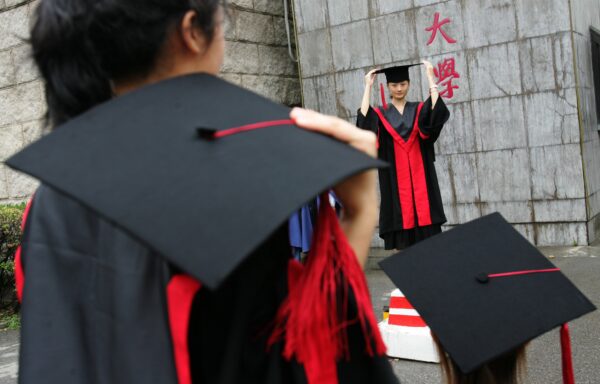Top Chinese University Released 30 Obituaries Since December
COVID-19 infections in China surged in early December 2022. The sudden increase in celebrity deaths raised doubts over the country’s officially-announced COVID death toll. Since December, at least 30 professors at Renmin University have passed away, 29 of whom were members of the Chinese Communist Party (CCP), including former university president Huang Da, Marxist theorist Lu Guishan, and Xu Zhengfan, one of the so-called “founding fathers” of the Marxist theory of the CCP. Huang Da, born in 1925, died in Beijing on Feb. 18, 2023, at the age of 98. He served as Vice President of Renmin University from 1983, was the first Dean of the university’s School of Economics in 1988, and was president of the university from November 1991 to June 1994, when he began receiving special allowances from the State Council. He also served as an advisor to the Social Science Committee of the Ministry of Education, was an honorary president of the China Society of Finance, and was a member of the first Monetary Policy Committee of the People’s Bank of China. Huang is the author of a series of major textbooks on finance, including “Money Circulation,” he has twice received the highest award in the CCP’s economic field. Lu Guishan, born in 1935, died on Feb. 12, 2023, at the age of 88. He joined the CCP in 1965, and was promoted to professor in 1986. His obituary praised him for being one of the first theorists in Marxist art and literary theory after the founding of the People’s Republic of China. He had served as an advisor to the National Marxist-Leninist Studies Association, head of the textbook evaluation team for the Marxist Theory Research and Construction Project, and vice president of the National Marxist-Leninist Studies Association. Lu was awarded the Lifetime Achievement Award for Marxist-Leninist Studies, and several of the textbooks he edited received national awards. He had been a recipient of a special allowance from the State Council since 1992. Xu Zhengfan, a First Class Honorary Professor at Renmin University, died on Dec. 28 in Beijing at the age of 95. The University announced his death two days later, praising him for being “an outstanding member of the CCP, Marxist theorist and theoretical educator, [and] one of the main founders of the Marxist theory for the CCP.” Since the 1950s, Xu frequently published theoretical articles on the so-called “socialist revolution and construction” in many of the Party’s mouthpiece media and published several books on Marxism. In addition to these three Marxist scholars, six other professors on the recently deceased list were also professors who were dedicated to the study of Marxism or socialist economy. Hu Jun, a Marxist economist and educator was praised as one of the CCP’s main founders of the Marxist political economy; Yu Zhenzhou was an associate professor of Communist Party History at the School of Marxism; Han Zonghong, a professor of the School of International Relations, had participated in the translation of Predrag Vranicki’s book History of Marxism; Zhuang Cipeng, a professor of Economics, had long been engaged in the study and teaching of Marxist political economy and capital theory; Gu Xuerong, Professor of Economics, had focused on the study of socialist economic theory; Ge Rongjin was a professor of Philosophy teaching Marxist-Leninist classics. As the norm for all recent high-profile deaths, the obituaries did not specify what caused their deaths. Renmin University’s ‘Red Gene’ Renmin University is the first official university founded by the CCP after it seized power in mainland China. Its predecessor was the Shaanxi North Public School, founded by the CCP in 1937 in Yan’an. The school’s official website claims Renmin University always “shares the breath and shares the same fate” with the CCP. In the Shaanxi North Public School period, Mao Zedong had been to the school ten times to give speeches. Graduates pose for pictures during a graduation ceremony at Renmin University in Beijing on June 29, 2006. (China Photos/Getty Images) After the founding of the People’s Republic of China, the CCP planned to establish Renmin University, which literally means the People’s University. On Oct. 3, 1950, former Chinese leader Liu Shaoqi attended the opening ceremony and called on Renmin University to quickly develop into an influential school and focus on the training of talents in the field of Marxist-Leninist theory as well as financial, political, and legal cadres. In later years, top Chinese leaders visited Renmin University multiple times, including Jiang Zemin, Hu Jintao, and Xi Jinping. Xi visited the university five times in 2005, 2006, 2009, 2012, and 2022. In 2017, Xi sent a letter congratulating the school on its 80th anniversary and asked it to “solve the fundamental problems of for whom we train talents, what type of people to turn them into, and how to train them.” The school’s official website states that since the establishment o

COVID-19 infections in China surged in early December 2022. The sudden increase in celebrity deaths raised doubts over the country’s officially-announced COVID death toll. Since December, at least 30 professors at Renmin University have passed away, 29 of whom were members of the Chinese Communist Party (CCP), including former university president Huang Da, Marxist theorist Lu Guishan, and Xu Zhengfan, one of the so-called “founding fathers” of the Marxist theory of the CCP.
Huang Da, born in 1925, died in Beijing on Feb. 18, 2023, at the age of 98. He served as Vice President of Renmin University from 1983, was the first Dean of the university’s School of Economics in 1988, and was president of the university from November 1991 to June 1994, when he began receiving special allowances from the State Council. He also served as an advisor to the Social Science Committee of the Ministry of Education, was an honorary president of the China Society of Finance, and was a member of the first Monetary Policy Committee of the People’s Bank of China.
Huang is the author of a series of major textbooks on finance, including “Money Circulation,” he has twice received the highest award in the CCP’s economic field.
Lu Guishan, born in 1935, died on Feb. 12, 2023, at the age of 88. He joined the CCP in 1965, and was promoted to professor in 1986. His obituary praised him for being one of the first theorists in Marxist art and literary theory after the founding of the People’s Republic of China. He had served as an advisor to the National Marxist-Leninist Studies Association, head of the textbook evaluation team for the Marxist Theory Research and Construction Project, and vice president of the National Marxist-Leninist Studies Association.
Lu was awarded the Lifetime Achievement Award for Marxist-Leninist Studies, and several of the textbooks he edited received national awards. He had been a recipient of a special allowance from the State Council since 1992.
Xu Zhengfan, a First Class Honorary Professor at Renmin University, died on Dec. 28 in Beijing at the age of 95.
The University announced his death two days later, praising him for being “an outstanding member of the CCP, Marxist theorist and theoretical educator, [and] one of the main founders of the Marxist theory for the CCP.”
Since the 1950s, Xu frequently published theoretical articles on the so-called “socialist revolution and construction” in many of the Party’s mouthpiece media and published several books on Marxism.
In addition to these three Marxist scholars, six other professors on the recently deceased list were also professors who were dedicated to the study of Marxism or socialist economy.
Hu Jun, a Marxist economist and educator was praised as one of the CCP’s main founders of the Marxist political economy; Yu Zhenzhou was an associate professor of Communist Party History at the School of Marxism; Han Zonghong, a professor of the School of International Relations, had participated in the translation of Predrag Vranicki’s book History of Marxism; Zhuang Cipeng, a professor of Economics, had long been engaged in the study and teaching of Marxist political economy and capital theory; Gu Xuerong, Professor of Economics, had focused on the study of socialist economic theory; Ge Rongjin was a professor of Philosophy teaching Marxist-Leninist classics.
As the norm for all recent high-profile deaths, the obituaries did not specify what caused their deaths.
Renmin University’s ‘Red Gene’
Renmin University is the first official university founded by the CCP after it seized power in mainland China. Its predecessor was the Shaanxi North Public School, founded by the CCP in 1937 in Yan’an. The school’s official website claims Renmin University always “shares the breath and shares the same fate” with the CCP.
In the Shaanxi North Public School period, Mao Zedong had been to the school ten times to give speeches.

After the founding of the People’s Republic of China, the CCP planned to establish Renmin University, which literally means the People’s University. On Oct. 3, 1950, former Chinese leader Liu Shaoqi attended the opening ceremony and called on Renmin University to quickly develop into an influential school and focus on the training of talents in the field of Marxist-Leninist theory as well as financial, political, and legal cadres.
In later years, top Chinese leaders visited Renmin University multiple times, including Jiang Zemin, Hu Jintao, and Xi Jinping.
Xi visited the university five times in 2005, 2006, 2009, 2012, and 2022. In 2017, Xi sent a letter congratulating the school on its 80th anniversary and asked it to “solve the fundamental problems of for whom we train talents, what type of people to turn them into, and how to train them.”
The school’s official website states that since the establishment of the university, it has always “adhered to the leadership of the CCP, inherited the Red Gene, and formed a highland of Marxism teaching and research,” among other features. Renmin University was the first to establish the subjects of CCP’s economics, law, journalism, and Marxist theory, which have then been propagated nationwide.
Target of the Pandemic
In March 2020, during the initial stage of the COVID-19 pandemic, Falun Gong founder Li Hongzhi said in an article titled “Stay Rational,” “Truth be told, pandemics only come when people’s morals and values have turned bad, and they have come to have a massive amount of karma.”
He specifically pointed out that the pandemic has a clear target.
“A pandemic like the current Chinese communist virus (or ‘Wuhan virus’) comes with a purpose behind it, and it has targets. It is here to weed out members of the Party and those who have sided with it,” Li said.
In his article, Li advised, “What people should do, instead, is to repent to the divine with all due sincerity, admit to their faults, and pray for a chance to change their ways.”












